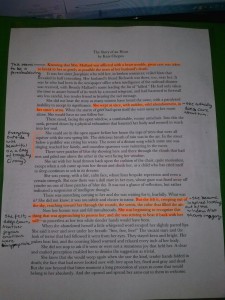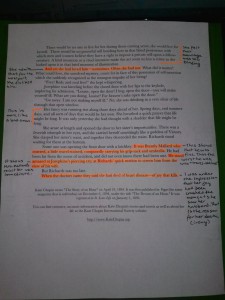Tag Archives: The Story of an Hour
TSOH vs. TYW
The narrator in “The Yellow Wallpaper” is unreliable, here are quotes and explanations to highlight this.
“I sometimes fancy that in my condition if I had less opposition and more society and stimulus- but John says the very worst thing I can do is to think about my condition, and I confess it always makes me feel bad” the narrator says.
Followed with “So I will let it alone and talk about the house”.
It is clear that the narrator is unreliable because she is admitting she has a problem. If she has a problem how can she be reliable? After she admits she has a problem she then quickly drops it and moves on to a different subject.
“I don’t feel as if it is worth while to turn my hand over for anything, and I’m getting dreadfully fretful and querulous” she says.
Followed with “I cry at nothing, and cry most of the time”
This is a sure sign that she is unreliable because she breaks at nothing. She actually says and is conscious that she is emotionally breaking at nothing and crying most of the time. She also does not think it is worth while to turn her hand over for anything, this tells me she has no self motivation and that is a sign she is unreliable.
*fretful- disposed or quick to fret; irritable or peevish.
The narrator in “The Story of An Hour” is reliable.
I believe the narrator in “The Story of An Hour” is reliable because she is simply telling a story and that is all. She has no influence or emotion in the story. She does not contribute to the story to effect it positive or negative.
What killed Mrs. Mallard, Extreme Joy or Shocking Disappointment?
“The Story of an Hour,” by Kate Chopin, depicts the life of a woman whose husband had just passed, or so she thought. Throughout the short story, there is a great deal of imagery, foreshadowing, and irony even at the very end.
The protagonist, Mrs. Mallard, is straight-away revealed to have a heart problem, which makes her delicate to shocking situations. I saw that as a foreshadowing of how the story will end. She was gently told about her husband’s death and she broke down immediately. This goes to show that she really cared about her husband. Then there is some imagery mixed with irony in the story as Mrs. Mallard gazes out the window in a daze. A tragic accident occurred, and outside the window it seemed like a calm beautiful day. I believe that the scene outside brought a spark into Mrs. Mallard. She began to feel something “creeping” up inside her. She tried to fight the feeling, because deep down she knew that feeling so joyous at the death of her husband was very inappropriate; but she couldn’t fight it. She felt that marriage was overly binding. Though she loved her husband, for the most part she disliked him; maybe even hated him. She began to feel overjoyed at the possibility of her new life, a long life, just for herself. This seemed like a bad omen to me, mostly because of the information about her medical issue in the very beginning.
Toward the end, as a plot-twist, Mr. Mallard appears alive; at worst, he is “travel-stained.” Mrs. Mallard reaction was immediate, causing her death. I noticed this from the fact that, as soon as he walked in, Mrs. Mallard’s sister, Josephine, screamed. The doctors figured that she died of the extreme joy she felt. However, I say it was disappointment. Mr. Mallard turned up alive, killing her extreme joy when she thought he was dead.





